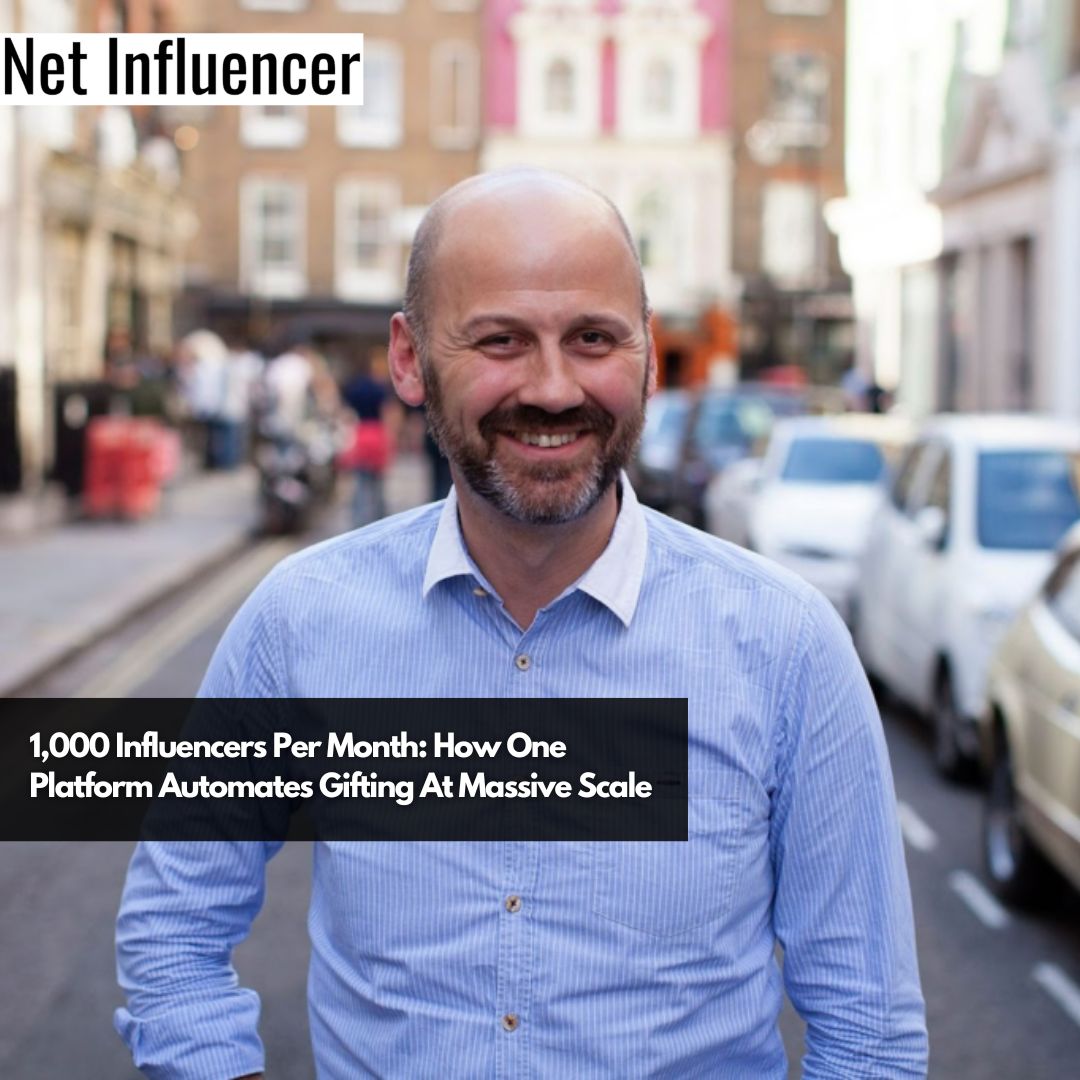Technology
1,000 Influencers Per Month: How One Platform Automates Gifting At Massive Scale
The Rise of the Creator Economy
As influencer marketing continues to grow, brands are increasingly turning to content creators to promote their products and connect with target audiences. However, managing influencer gifting campaigns at scale can be a daunting task, riddled with logistical challenges. Enter Dyzio, a data and analytics platform designed to streamline the influencer marketing process.

“We help brands and agencies track their influencer campaigns at scale,” explains Matt Hebden, Co-Founder and CEO of Dyzio. “That’s when they are generally collaborating with large numbers of influencers at one time. We enable them to track the effectiveness of their influencer program across all the different social channels, whether it’s Instagram, Facebook, YouTube or TikTok.”
Automating the Influencer Gifting Process
One of Dyzio’s standout offerings is Shopfluence, a product that automates the influencer gifting process, enabling brands to distribute products to creators efficiently while tracking performance metrics.
“Finding influencers is a massive pain point. You can pay for influencer discovery software or you can search manually for days looking through Instagram or TikTok,” says Hebden, highlighting a common challenge faced by brands. “Once you’ve found the influencers who would be happy to post content for your product or brand, you then have to find their addresses and start packaging and posting products out to them.”
Shopfluence streamlines the gifting process by helping brands find influencers, and then supporting gift distribution and content tracking. Brands provide a brief detailing their desired influencer profile, and Dyzio’s platform identifies relevant creators. These influencers are then provided with a code to purchase the product directly from the brand’s e-commerce website, eliminating the need for manual distribution.
“We then work with the brand on the content brief that gets sent out to each influencer,” Hebden explains. “It’s like, ‘This is what you should say about the brand, the product and the features and these are the hashtags you should use’.”
Influencers also receive a discount code to share with their followers, incentivizing them to purchase the brand’s products. Shopfluence tracks when influencers post, capturing the content and monitoring data on engagement, reach, and sales.
Scaling Influencer Gifting with Automated Efficiency
For brands previously mired in the manual labor of managing influencer gifting campaigns, Dyzio’s Shopfluence platform represents a revolutionary leap in efficiency and scalability. The platform’s automation capabilities streamline every aspect of the process, from influencer recruitment and communication to product distribution, content tracking, and performance analysis.
“We take away the need to communicate with influencers individually or having to worry about spreadsheets,” Hebden explains. “We remove those pain points for brands. Through the software, you can seamlessly communicate with hundreds or even thousands of influencers in a single campaign.”
Hebden cites one brand that has leveraged Shopfluence to exponentially expand their influencer gifting program. “We have one brand sending out over a thousand gifts a month. They were originally only managing around 100 per month manually,” he reveals. “By working with Shopfluence to identify and recruit new influencers into the system, the entire process becomes automated at scale.”
This automation extends beyond the initial influencer outreach and onboarding. Shopfluence takes all the labor out of tracking which influencers have posted content and analyzing performance metrics. “Any of the manual tasks you used to manage are now controlled by the platform,” states Hebden. “You can start a campaign with 100 influencers, and we’ll ensure you get as close as possible to 100% of them posting by the end.”
Real-Time Analytics and Reporting
Shopfluence’s real-time analytics and reporting features empower brands to gauge the success of their influencer campaigns effectively. “We can track whatever data is available on that particular platform. So if it’s Instagram or TikTok, we can track the likes, comments, shares, views, etc. and all of that data is provided in real-time on the platform,” Hebden explains.
Moreover, the platform integrates e-commerce sales data, enabling brands to calculate key performance indicators like CPA (cost per acquisition) and identify top-performing influencers. “We can start to rank your influencers in terms of which ones are really delivering sales and driving your business forward,” Hebden adds.
Brand Safety and Control
Maintaining brand safety and controlling messaging are paramount concerns for companies leveraging influencer marketing. Shopfluence addresses these issues through white-labeling and customization options. “Essentially, the brand can completely customize the platform. So when communications go out to the influencers, it has their logos and comes from their company email address, which helps build trust and credibility in their gifting program,” Hebden states.
Additionally, brands can collaborate with Dyzio to develop detailed content briefs, outlining acceptable messaging, product details, and required hashtags. “We can track the content and we give the influencers enough guidance so they can make sure the content is authentic in their own style, but they understand what they should and shouldn’t say about the products,” Hebden explains.
A Case Study: Abbott Lyon
One brand that has experienced remarkable success with Shopfluence is Abbott Lyon, a UK-based personalized jewelry company. Previously, Abbott Lyon was gifting around 100 pieces of jewelry per month, a process that consumed significant time and resources. “Through our software, we automated the entire process,” Hebden recounts. “And they scaled from sending gifts to 100 influencers a month to over a thousand.”
The primary factor contributing to Abbott Lyon’s success, according to Hebden, was automation. “Not having to communicate individually with influencers, not having to send out individual products, not having to be tracking content manually… we just automated that process from end-to-end.”
Emerging Trends and Future Plans
As the influencer marketing landscape continues to evolve, Dyzio is poised to address emerging trends and challenges. Hebden cites user-generated content (UGC) as “a growing priority for brands seeking authentic, relatable marketing content, especially with the massive growth and importance of TikTok”.
“Brands are looking to be more involved with micro-influencers to help them create UGC,” he notes. “So can we help brands collaborate with high volumes of micro-influencers, who are specifically aimed at your niche.” To meet this demand, Shopfluence aims to facilitate seamless collaboration with numerous micro-influencers within niche communities.
Looking ahead, Dyzio plans to integrate Shopfluence with additional e-commerce platforms beyond Shopify, as well as explore paid media amplification for top-performing influencer content.
Empowering Creators and Enabling Collaboration
Underpinning Dyzio’s mission is a commitment to empowering creators and fostering mutually beneficial brand-influencer relationships. “We want to offer commissions to influencers where possible,” Hebden states. “And we’re building a large connected network of influencers that want to work on these gifting campaigns and want to work with DTC brands.”
Dyzio encourages brands to cultivate long-term partnerships with successful influencers, potentially transitioning them into brand ambassador roles. Conversely, the platform aims to provide creators with visibility and opportunities to collaborate with leading brands.
“We’re also trying to think about how to bring gamification into the platform in the future. How do we make it fun and engaging, offering rewards and bonuses to top performers?” Hebden muses, hinting at Dyzio’s vision for an engaging, rewarding experience for creators.
For e-commerce brands seeking to leverage influencer marketing effectively, Hebden offers simple advice: “Test and learn.”
“With micro-influencers, you need to reach out to a broad variety to find the right ones for your brand,” he advises. “But, if you can run a test with ten or twenty micro-influencers, you might find two that work really well, and then you can start inviting the best performers into a longer-term brand ambassador program.”
As the creator economy continues its rapid ascent, platforms like Shopfluence are poised to play a pivotal role in streamlining influencer marketing, empowering brands and creators alike to forge lucrative, mutually beneficial partnerships at scale.

















